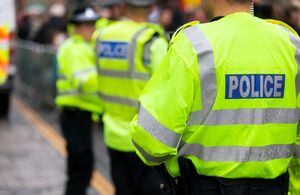New police powers to protect communities from disruption caused by protests
Police forces will be authorised to consider the ‘cumulative impact’ of protests, assessing previous activity when deciding to impose limits on protesters.

Getty Images
Police forces will be granted new powers to put conditions on repeat protests as the Home Secretary orders a fresh look at how protests are policed and organised.
The new powers, which will be brought forward as soon as possible, will allow senior officers to consider the ‘cumulative impact’ of previous protest activity.
If a protest has taken place at the same site for weeks on end, and caused repeated disorder, the police will have the authority to, for example, instruct organisers to hold the event somewhere else. Anyone who breaches the conditions will risk arrest and prosecution.
The Home Secretary will also review existing legislation to ensure that powers are sufficient and being consistently applied. This will include powers to ban protests outright, and will also include provisions in the Crime and Policing Bill, which is currently going through Parliament.
Home Secretary Shabana Mahmood said:
The right to protest is a fundamental freedom in our country. However, this freedom must be balanced with the freedom of their neighbours to live their lives without fear.
Large, repeated protests can leave sections of our country, particularly religious communities, feeling unsafe, intimidated and scared to leave their homes. This has been particularly evident in relation to the considerable fear within the Jewish community, which has been expressed to me on many occasions in these recent difficult days.
These changes mark an important step in ensuring we protect the right to protest while ensuring all feel safe in this country.
The government will make the improvements by amending sections 12 and 14 of the Public Order Act 1986 to explicitly allow the police to take account of the cumulative impact of frequent protests on local areas in order to impose conditions on public processions and assemblies.
Further details will be set out in due course.
Policing Minister Sarah Jones visited Lambeth police HQ yesterday to see the Metropolitan Police’s response to yesterday’s protests where almost 500 were arrested. Most of those arrests were made for supporting the proscribed group, Palestine Action.
The minister spoke to Metropolitan Police leaders on the challenges of the protests and how new technology like live facial recognition could help in the future.
The Home Secretary will also write to chief constables today, thanking them for their swift and professional response following Thursday’s terrible attack and at protests across the country. She will encourage them to use the full range of powers available to them to prevent and respond to public disorder.
Following the Yom Kippur terrorist attack in Manchester, the Secretary of State for Housing, Communities and Local Government Steve Reed has written to local authorities encouraging them to use their existing resources and powers to ensure Jewish communities are protected in the coming days and weeks, including limiting protest activity as much as possible.
All police forces in England and Wales are working with the Community Security Trust to reassure and offer additional support to the 538 different synagogues and Jewish community sites across the country.
Today’s announcement builds on measures already in the Crime and Policing Bill going through Parliament to support the policing of protests:
- banning the possession of fireworks, flares and other pyrotechnics at protests
- criminalising the climbing of specified war memorials, making it clear that such disrespectful behaviour is unacceptable
- banning the use of face coverings to conceal a person’s identity at protests designated by the police